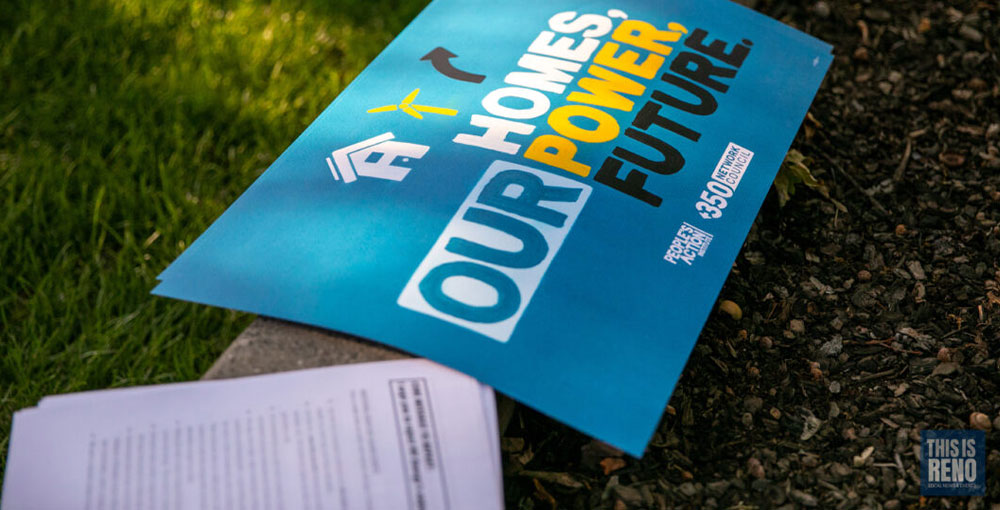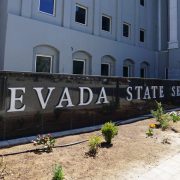Date:
April 11, 2025
by Jeniffer Solis, Nevada Current
Data on households in Nevada facing power or gas shut offs due to nonpayment amid scorching summers and frigid winters is largely unknown.
That could change under a bill that would require utilities to report on a quarterly basis the number of disconnections due to non-payment broken down by month and zip code. Senate Bill 442, sponsored by the Senate Committee on Growth and Infrastructure, was presented to lawmakers by state Democratic Sen. Melanie Scheible on Monday.
Nevada does not require utilities to publicly disclose the number of customers they disconnect, leaving little transparency to understand the full extent of disconnections. Nationally, 26 states and Washington D.C. require some level of public reporting on utility disconnections due to nonpayment.
Limited data collected by utility regulators shows a growing trend in the number of residents in the state who have had their power cut due to nonpayment. Nearly 32,000 Nevadans had their power disconnected by NV Energy for nonpayment in 2024, according to the Public Utilities Commission of Nevada.
“The information that we do have highlights the need for better reporting,” said Olivia Tanager, the director of the Sierra Club Toiyabe Chapter which covers Nevada and the Eastern Sierra. The Sierra Club Toiyabe Chapter recommended the bill and helped present the bill to lawmakers on Monday.
Supporters of the bill say mandatory disconnection reporting by month and zip code would provide health departments, community-based organizations, and public services in Nevada with the data they need to identify the communities most at risk of disconnection. That data could then be used to focus public assistance on where, and when, it’s most needed.
“We continue to see rising utility costs associated with more extreme weather and an increasing number of households facing financial difficulties. It is vital that we have the data we need to understand the full scope of this issue and take informed, meaningful action,” Tanager continued.
According to the most recent data from the U.S. Energy Information Administration, 1 in 4 American households experience some form of energy insecurity – an inability to afford household energy needs – each year, with little improvement over the past decade.
“These disconnections can have severe consequences, not only leaving individuals and families without essential services like electricity and heating, but also contributing to broader economic and social instability,” Tanager said during the Monday hearing on the bill.
During the hearing, both NV Energy and Southwest Gas testified as neutral on the bill, noting their existing energy assistance programs as well as the potential benefits of the bill in directing outside resources.
The legislation’s advocates say the Trump administration’s ongoing policies to pause and/or cancel disbursement of federal funds cast doubt on the stability of federal energy affordability programs.
Federal employees for the Low Income Home Energy Assistance Program (LIHEAP) — which provides funding to help low-income households pay for energy costs — were fired last week as part of a dramatic restructuring of the Department of Health and Human Services, making the future of the program unclear.
In 2024 Nevada received $17 million in LIHEAP funding to help about 12,000 low-income households keep their lights on.
“All of those folks that administer that program were unfortunately fired, and so there is some question about the longevity of LIHEAP and how that’s going to impact folks,” Tanager said.
Several advocacy groups testified in support for the bill Monday including, the Northern Nevada Central Labor Council, United Way of Southern Nevada, the Nevada Environmental Justice Coalition, Mormon Women for Ethical Government, and the Moms for Clean Air.
Congress has expressed an interest in determining the scale and scope of electricity disconnections in recent years. In 2022, Congress directed the U.S. Energy Information Administration to begin collecting monthly data on utility disconnections, but the lack of public data has made comprehensive national data difficult to obtain, according to the Congressional Research Service.
Limited data does show that Black and Hispanic households are statistically more likely to have their power disconnected, according to a 2023 report on electric utility disconnections by the Congressional Research Service.
“The intent of the bill is to make sure that we have regular information so that we can drive services that exist to help folks keep their lights on where they’re most needed, when they’re most needed,” Tanager said.
The committee took no action on the bill.
Nevada Current is part of States Newsroom, a nonprofit news network supported by grants and a coalition of donors as a 501c(3) public charity. Nevada Current maintains editorial independence. Contact Editor Hugh Jackson for questions: info@nevadacurrent.com.







